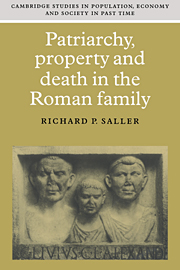Book contents
- Frontmatter
- Contents
- List of tables
- Preface
- Abbreviations
- 1 Introduction: approaches to the history of the Roman family
- Part I Roman life course and kinship: biology and culture
- 2 Roman patterns of death, marriage and birth
- 3 Simulation of Roman family and kinship
- Part II Roman family and culture: definitions and norms
- Part III The devolution of property in the Roman family
- Bibliography
- Index
- Cambridge Studies in Population, Economy and Society in Past Time
3 - Simulation of Roman family and kinship
Published online by Cambridge University Press: 23 November 2009
- Frontmatter
- Contents
- List of tables
- Preface
- Abbreviations
- 1 Introduction: approaches to the history of the Roman family
- Part I Roman life course and kinship: biology and culture
- 2 Roman patterns of death, marriage and birth
- 3 Simulation of Roman family and kinship
- Part II Roman family and culture: definitions and norms
- Part III The devolution of property in the Roman family
- Bibliography
- Index
- Cambridge Studies in Population, Economy and Society in Past Time
Summary
The Romans considered the bonds of family and kinship to be biologically based but not biologically determined. It is the biological basis that opens the possibility of simulating the kinship universe with the aid of a computer. Roman authors saw the beginnings of kinship bonds and of the wider society in the biological reproduction of the married man and woman. Roman law, to be sure, offered citizens a flexibility in restructuring their kinship bonds that was remarkable by later European standards: not only were divorce and remarriage easy in the classical period, but adoption permitted change of filiation. Nevertheless, adoption was apparently not so common as to vitiate a model of the kinship universe based on biological reproduction.
Anthropologists have stressed that, within the universe of those linked by reproduction or marriage, not only do particular cultures systematically stress certain bonds over others, but individuals make choices about which relationships to maintain and cultivate out of the kinship system as culturally defined from the biological kinship universe. Generally, choice becomes more evident among more distant kin. The significance of cultural and individual choices in defining kinship roles is beyond question, but to understand the choices and the definition of kinship roles it is important to have a sense of the kinship universe that flowed from marriage at certain ages and from the biological events of birth and death. For example, Roman law suggests that paternal uncles had a special culturally defined role; the social significance of that role, however, depended in part on whether Romans at certain stages of life had a living paternal uncle to fulfill the role.
- Type
- Chapter
- Information
- Patriarchy, Property and Death in the Roman Family , pp. 43 - 70Publisher: Cambridge University PressPrint publication year: 1994
- 2
- Cited by



